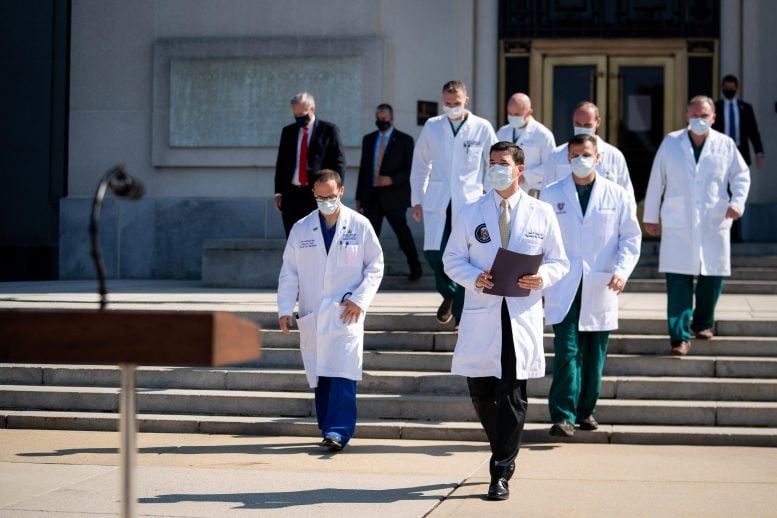
With 74-year-old President Trump and 50-year-old first lady Melania Trump testing positive for the coronavirus, what are the best proven treatments for them and other patients?
We are both physician–scientists at the University of Virginia. We care for COVID-19 patients and conduct research to find better ways to diagnose and treat COVID-19.
Here we are sharing what physicians have learned over the past eight months treating various stages of this disease. Early in the year, there were few known treatments for people who showed severe COVID-19 symptoms apart from sustaining them on ventilators. Now, several months later, there are a handful of treatments, including drugs, that give doctors far better tools to heal patients, particularly very ill ones.
Who is at greatest risk for severe COVID-19?
Men are one-and-a-half times more likely to die, and an 80-year-old has a twentyfold greater risk of death than a 50-year-old. In addition to age and male gender, obesity; diabetes; recent cancer diagnosis; chronic heart, lung and liver disease; stroke; and dementia all are associated with an increased risk of dying from COVID-19. Based on these criteria, the president falls into a higher-risk category based on male gender and age.
Is treatment different depending upon how sick one is?
The approach to therapy differs depending on the stage of the illness.
It is therefore important to not only diagnose COVID-19 but to define whether the infection is asymptomatic or pre-symptomatic. Also, how sick a person is – whether it’s a mild, moderate, severe or critical case – changes how a patient is treated.
What treatment is there for asymptomatic or pre-symptomatic infection?
Asymptomatic or pre-symptomatic infection is defined as having a positive diagnostic test for COVID-19 (a PCR or antigen detection test) without symptoms of infection.
There is currently no known effective treatment for this stage. Someone with asymptomatic or pre-symptomatic infection should isolate themself at home for 10 days so as not to expose others.
What are the symptoms of mild disease, and what treatments work?
Symptoms of mild COVID-19 infection can include fever, cough, loss of taste or smell, muscle aches, headache, nausea, vomiting, diarrhea, congestion, and runny nose.
Someone with mild COVID-19 does not have shortness of breath, chest pain or evidence of pneumonia during a chest X-ray. The exception to this is children with mild disease who may still have an abnormal X-ray.
There are no treatments that have been demonstrated to benefit those with mild disease. However, such patients should be well versed on the symptoms of moderate illness, so that they and others recognize if they progress to moderate illness. This is important because progression to more severe disease can be rapid – typically five to 10 days after initial symptoms.
Moderate illness
Moderate illness is defined as shortness of breath, chest pain, or on a chest X-ray, evidence of pneumonia but without hypoxia (low blood oxygen levels).
There currently is no known effective therapy for moderate illness.
Severe illness
Severe illness is identified by a rapid breathing rate (greater than 30 breaths per minute) or low oxygen levels in the blood, which is called hypoxia. Also, evidence of pneumonia affecting more than half of the lungs, as diagnosed on a chest X-ray, is a sign of a severe case.
Controlled clinical trials have demonstrated that the antiviral drug remdesivir hastens recovery for patients with severe but not critical illness.
In addition, the anti-inflammatory steroid medicine dexamethasone (a prednisone-like drug) decreases mortality.
Critical illness
Critical illness occurs when the patient becomes so sick that vital organs begin to fail and they require medicines or other therapies to support these vital functions.
If failure of the lungs is severe enough, physicians may put the patient on a mechanical ventilator or high quantities of oxygen. There is no evidence that remdesivir treatment is beneficial during this critical phase. Dexamethasone is still recommended for treatment because it has been shown to decrease mortality.

What therapies don’t work or are still being tested?
Some treatments that have been shown to be ineffective include chloroquine and hydroxychloroquine.
Other potential treatments are still in the middle of clinical trials to test whether they are effective. These include human convalescent plasma, which contains antibodies that should bind to the virus and prevent it from entering cells.
There are also drugs to modulate the immune response, such as interferons and inhibitors of IL-6, which in some cases may prevent a harmful overreaction of the immune system, commonly referred to as cytokine storm.
Newer treatments, including one President Trump has been given
Right now there is no approved treatment for outpatients with asymptomatic or mild to moderate COVID-19. But this appears to be changing, with Eli Lilly’s and Regeneron’s release of clinical trial data on the use of laboratory-manufactured antibodies against the spike glycoprotein of the new coronavirus.
In this approach, as with convalescent plasma, the antibodies work by binding to the virus and blocking it from entering cells and multiplying. This could be particularly effective early on in infection before illness becomes severe.
In an early preview of data from an ongoing phase three clinical trial, subjects with COVID-19 who received an injection of a cocktail of monoclonal antibodies against the SARS-CoV-2 spike glycoprotein had symptoms that lasted only seven days rather than 13. The amount of virus remaining in the nasopharynx – the upper part of the throat behind the nose – was also reduced.
An update from the president’s physician on the afternoon of October 2 indicated that, as a precautionary measure, the president received an infusion of Regeneron’s antibody cocktail. This treatment is not widely available, and can be given only under what is called compassionate use.
On the same day, the president reportedly also received supplemental oxygen and a first dose of the antiviral drug Remdesivir. Research shows this antiviral can decrease the length of COVID-19 patients’ hospital stays, but only when given prior to the patient needing mechanical ventilation.
On Saturday, October 3, the president received a second dose of Remdesivir and a first dose of the steroid dexamethasone. Dexamethasone is an anti-inflammatory medicine in the same class as prednisone. It decreases mortality in patients with COVID-19 that is severe enough to require supplemental oxygen, but may actually worsen disease in those who are not as severely ill.
All of this suggests that the president is receiving state-of-the-art therapies.
Written by William Petri, Professor of Medicine the University of Virginia and Jeffrey M. Sturek, Assistant Professor of Medicine at the University of Virginia.
Adapted from an article originally published on The Conversation.![]()
5 Comments
I am concerned that “State-of-the-Art” treatment can sometimes be inferior to routine treatment. The use of high dose I.V. steroids in the case of the former, can both surpress the early and needed immune response to fighting off the viral invasion, and can trigger a manic psychosis which can distort and display inappropriate perception of oneself and one`s surroundings, and even be associated with hallucinations and delusions. If given to a person responsible for the county`s safety and for making critical decisions, and if these symptoms are suspected, a psychiatric evaluation should be performed, and consideration of at least temporary instituion of the 25th ammendant of the U.S. Constitution needs to be considered. PIM, MD
The indicated website describes how COVID initiates the extreme inflammatory responses that cause so much of the damage. There are two countering angiotensin enzymes that regulate a molecule called angiotensin II that causes inflammation, usually in response to injury. ACE2, the target of COVID-19, tends to inhibit the molecule while ACE1 produces it. There are numerous ACE inhibitors on the market that block ACE1 and limit inflammation and the article mentions a clinical trial of one kind as a treatment for COVID symptoms.
More trials of this kind are needed urgently. Of particular importance is drug interaction with other potential medicines for COVID like hydroxychloroquine and dexamethasone, the latter of which is currently being used to treat the president.
I’m also wondering if there are any drugs that block ACE2 on their own, in essence jamming the locks COVID needs to enter cells and multiply.
https://theconversation.com/what-is-the-ace2-receptor-how-is-it-connected-to-coronavirus-and-why-might-it-be-key-to-treating-covid-19-the-experts-explain-136928
I thought the website would show up if I entered one. Had to enter it manually.
This Covid-19 appears to be like a Stealth Bomber and after entering the human ecosystem it seems to fly under the radar. This is clear from the latest research findings aboout it disbling the normal mechanisms used to fight of invaders like pain as it actually provides paIN relief and THE ability of the virus to lull infected patients into a false sense of well being and traveling quietly to all the organs which may be immune compromised and infecting the same to cause failure of the same, appreas to be the Modus Operendi.
Maybe the Generals in the Defense department may have a better idea of how to handle such steath bombers. The latest research article on use of decoys is very interesting.
What a hit job. Hydroxychoroquine has been shown to work in so many European studies it is ridiculous to deny it. France, china, South korea all use it. Yale professor predicted 180000 more deaths without using it by september, back in May and look what happened. You should be ashamed.